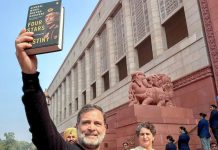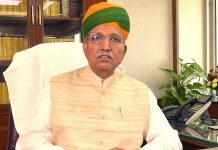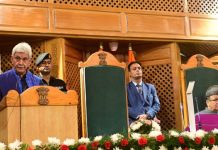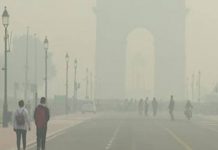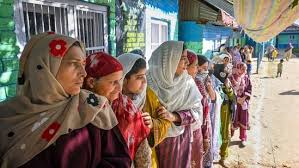
“The political parties have totally ignored women,” Zahida, a college student in Srinagar, is disappointed as first assembly elections in Jammu and Kashmir since the abrogation of Article 370.
“Leave male candidates, even women contestants are not given much importance to grave issues such as domestic violence, rape, harassment against women at workplaces and streets. So far, we have not seen any candidates discussing these issues in rallies in Srinagar,” said another student, Mehak.
Jammu and Kashmir, a region known for its intricate political and social dynamics, is witnessing its first assembly polls in a decade. The last Assembly elections were held in 2014, and since then, the political landscape has undergone significant changes. While enthusiasm for democratic exercise has gripped the Union Territory, there is a wave of dismay among women in Kashmir and the reason is election manifestos devoid of women issues despite female voters constituting nearly half of the total proportion of voters.
In Srinagar district, the number of women voters are more than men in eight assembly segments. In the first two phases of J & K polls, there are only 15 women candidates fielded by different political parties.
“it is unfortunate that political parties, particularly regional parties, ignored women safety issues in their manifestos. Like other states of India, Kashmir is also witnessing rising cases of crimes against women. The present manifestos fail to outline concrete measures for tackling violence, harassment, and discrimination, it shows women’s safety and their well-being are not priorities in our political landscape,” women’s rights activist, member women mediator from commonwealth Ezabir Ali said.
“Offering free rides in public transport does not claim safety and security for women in the valley,” Ezabir added.
The major political parties vying for power in Jammu and Kashmir—Congress, Bharatiya Janata Party (BJP), Jammu & Kashmir National Conference (JKNC), People’s Democratic Party (PDP), and various regional groups—have all unveiled their manifestos. Each party presents its own vision for the future of the valley, aiming to capture the support of the electorate with distinct promises and policy proposals.
How NC, PDP, BJP, Congress other regional parties missed the mark on women issues
All major parties share a common thread in manifestos, a focus on high-profile issues such as the restoration of Article 370, autonomy, statehood, and the revocation of the Public Safety Act (PSA). While these are undeniably significant topics for the region’s future, what turns out to be damp squib, is the absence of women’s issues.
The National Conference (NC), the oldest regional party, does mention women in its manifesto (providing govt schemes to weaker sections), but has nothing relevant to fight rising crimes against women in the Union Territory. Rather, NC focussed on restoration of Article 370, autonomy, statehood and revocation of the Public Safety Act (PSA). The People’s Democratic Party (PDP) and Bharatiya Janata Party (BJP) too have nothing extra to offer to women.
“Our party is committed to provide better facilities to people, particularly women, We have laws for the protection of women but they are not implemented. By putting protective measures, we can create an environment that not only stops crimes but also fosters respect and equality for all women,” says JKNC women’s wing president and Habba Kadal candidate Shameema Firdous.
She, however, accepted that the party manifesto must address the issues and comprehensive support systems for women. It should focus on the strong implementation of laws designed specifically to safeguard women’s rights and well-being.
Dilshad Shaheen, the women’s wing president of the J&K Apni Party claimed that the party is new and they are encouraging more women to join politics.
“Our party was formed just 4 years ago. We have been encouraging more women to join politics and provide various opportunities to ensure critical issues pertaining to women must be prioritized and addressed effectively.”
Despite being led by probably the tallest woman leader of Jammu and Kashmir, former CM Mehbooba Mufti, PDP has missed gender issues in its manifesto. Similarly, other parties as well, refused to pitch promises related to such issues at a time when Jammu and Kashmir is witnessing a disturbing rise in crimes against women. Reports from the National Crime Records Bureau (NCRB) indicate significant increases in incidents such as rape, domestic violence, and kidnapping. Despite these alarming statistics, the manifestos of the contesting parties do not adequately address the need for comprehensive strategies to tackle these issues.
NCRB data raises alarm in J&K
Jammu and Kashmir, which was considered safe for women, is now witnessing a sharp rise in the incidents of crime against women. According to the National Crime Records Bureau (NCRB), a total of 3716 cases of crime against women were reported in 2022. The report revealed 287 cases of rape, 462 cases of kidnapping and abduction and 9 dowry deaths were reported.
The data also reveals 500 cases of domestic violence. Additionally, 886 cases of kidnapping and abduction and 1606 cases of assault ‘with intent to outrage their modesty’ were registered in the erstwhile state.
Amid the heated debates on political and administrative reforms, the voices and concerns of women in the valley have taken a backseat, raising questions about how comprehensively the manifestos address the diverse needs of the electorate. With female voters constituting nearly half of the total proportion of voters, political parties seem to have largely overlooked issues affecting women. Even the historically significant JKNC, which has been a major player in regional politics, seems to focus predominantly on restoration of Article 370, statehood.
The absence of a robust discourse on women’s issues in these manifestos raises concerns about the priorities of the political parties. With elections looming, the lack of focus on gender-specific policies reflects a broader pattern of sidelining women’s voices and concerns in the political arena.
Notably, the elections in the erstwhile state of Jammu and Kashmir are being held in three phases: September 18, September 25 and October 1. The counting of votes will be held on October 8.
(Shamshad Ali is a freelance journalist based in New Delhi. He tweets @_shamshad_ali)

